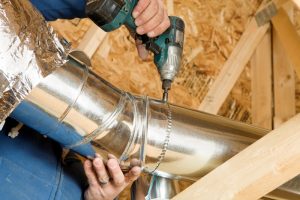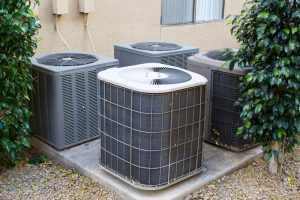When your forced-air heating and air conditioning system runs into trouble, you may be surprised to learn that the actually heating and AC unit might not be at fault. Sometimes, when a furnace or air conditioning system struggles to perform as it should, or if you notice hot or cold spots around the house, it’s actually due to a problem with the ducts. Ductwork is quite prone to leaks and cracks or unwelcome heat transfer, all of which is often due to faulty installation.
Unfortunately, a large number of ducts suffer from problems because the ducts were never set up properly in the first place. If heat can easily move into or out of the ducts, or if air is not well-contained, your heating and AC system may run into any number of issues. For example, air from your home blows over a cool coil in order to condition your home. The warm air keeps this coil from freezing, so without enough airflow, a frozen coil may drip water into your unit and cause serious component damage.
When heating or cool air cannot make it to your home because of leaks or due to an ineffective duct design, then the system has to work much harder than it should, which means parts wear down well before their time. Many times, your technician will simply repair the damage without attempting to figure out whether the ducts could be at fault.
If you decide it’s time for new ductwork in order to eliminate frequent heating and AC problems, custom ductwork design makes all the difference. A true ductwork professional will do the very best to make sure that no leaks or cracks are present and that they are unlikely to appear in a short time. These technicians will thoroughly inspect your existing ductwork before deciding whether sealing, repair, or replacement is best.
During installation, the technician must make several decisions to make sure the ducts are in an efficient location. They usually try to place ducts in a conditioned space so that heat cannot easily transfer out in the winter or enter the ducts in the summer. They’ll use the right fittings, connectors, and sealants, and try to form the ducts with as few twists and turns as possible for the most efficient pathway for delivery.
At Shavitz Heating and Air Conditioning, we’ve been around for a long time, so we’ve seen how poorly-designed ductwork can affect a home. Call us today and schedule an appointment with us for quality custom ductwork service in Lincolnwood, IL.
Continue Reading
Tags: Ductwork, Lincolnwood
Posted in Indoor Air Quality | Comments Off on How Custom Ductwork Makes a Difference
 This is probably not something you give a whole lot of consideration to, but your ductwork is actually a very vital part of your HVAC system. After all, your air ducts are the only way that the conditioned air from your central air conditioner—or forced air heater—will ever reach your living space.
This is probably not something you give a whole lot of consideration to, but your ductwork is actually a very vital part of your HVAC system. After all, your air ducts are the only way that the conditioned air from your central air conditioner—or forced air heater—will ever reach your living space.


 There are a few misconceptions homeowners have when it comes to air conditioning maintenance. One of these myths is that their refrigerant needs to be refilled (recharged) during each tune-up. The fact of the matter is, if your refrigerant needs to be refilled it means that you have a leak in need of repairs.
There are a few misconceptions homeowners have when it comes to air conditioning maintenance. One of these myths is that their refrigerant needs to be refilled (recharged) during each tune-up. The fact of the matter is, if your refrigerant needs to be refilled it means that you have a leak in need of repairs.